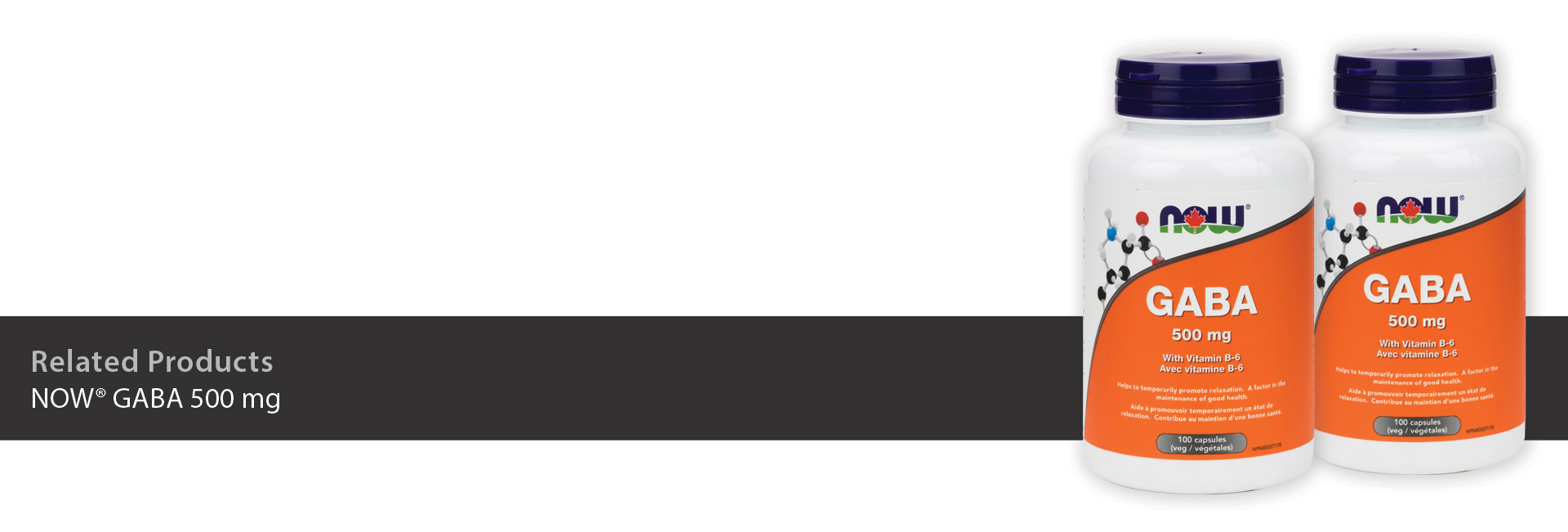

What is GABA?
We are living in difficult times. Amid a pandemic, many of us feel isolated and anxious. A recent survey on COVID-19 and Mental Health (SCMH) indicates that “one in four (25%) Canadians aged 18 and older screened positive for symptoms of depression, anxiety or post-traumatic stress disorder (PTSD) in spring 2021, up from one in five (21%) in fall 2020”. In addition to seeking professional help, natural solutions for anxiety, mood and stress, abound can be a significant first step in helping Canadians manage their mental health when drugs are not yet needed or necessary. GABA is a top-rated and affordable natural health product.
What is Gamma-Aminobutyric Acid (GABA)? Known as “the brain’s natural calming agent,” GABA is an amino acid that acts as an inhibitory neurotransmitter, regulating brain and nerve cell activity and preventing over-stimulation, which promotes relaxation and the easing of nervous tension. GABA’s widespread distribution in the brain explains its influence on many behaviours, including stress, anxiety, sleep regulation, memory, and mood. When GABA goes up, we wind down. As GABA drops, we become more anxious and panicked. Studies suggest that major depressive disorders can be associated with “altered GABA-mediated response.”
GABA Drugs. Prescription medications with similar structures to GABA (GABA analogs) treat a variety of disorders and diseases. GABA-targeted prescription medications include those for epilepsy (anticonvulsants), anxiety (anxiolytics), and sleep (sedative-hypnotics). There are downsides to these strong drugs: GABA analogs can be addictive and cause withdrawal symptoms such as seizures, are associated with an increase in suicidal thoughts and behaviors, have been known to cause fatal multi-organ sensitivities, and more. Dizziness and drowsiness are the most common side effects experienced on these drugs.
How do we get GABA? GABA can be synthesized in the body. We can also get small amounts of GABA from our diet, especially from fermented foods like kimchi and aged cheeses. Green tea and a handful of fruits, vegetables, and grains are also sources of GABA. We have recently discovered that some bacteria species in our gastrointestinal tract produce GABA. This intestinal GABA acts as a growth factor to help other bacteria thrive and correlates with brain patterns associated with depression. We can also get GABA in standardized doses over the counter. Available amounts range from 100 mg to 750 mg. Since GABA’s effects seem short-lived, some people repeatedly take low doses. Which works best is a matter of trial and error.
Recent evidence for GABA supplements? A recent (August 2020) comprehensive review of the current GABA literature has reinforced numerous positive anecdotes about GABA. This meta-analysis concludes that GABA “may have beneficial effects on both stress and sleep.” These conclusions are drawn both from subjective reports from participants in studies and objective biological markers. For example, GABA increases brain alpha waves associated with a relaxed state. For most, GABA is relaxing and calming but not particularly sedating (although sensitives may vary), so it can usually be used both during the daytime and before bed. While more studies are needed, it seems that doses between 100-300 mg may be necessary for GABA efficacy for sleep, ideally with at least one week of continuous use.
NOW® GABA 500 mg: NOW® Health Group has a wide range of GABA products for consumers to pick from. NOW® provides only the naturally occurring (referred to as the L-form) bioidentical version of GABA, the same type found in food, as well as in the body. Studies suggest that significantly lower doses of the natural form are needed as compared to synthetic GABA. NOW® GABA 500 mg includes vitamin B6, an essential component of our brain’s GABA pathway, for extra effectiveness. NOW® Health Group is family owned for over 50 years and is beloved for its exceptional attention to quality and value. Consult a health care practitioner before use if any of the following apply: pregnant, breastfeeding, using prescription anti-anxiety medications or experiencing epilepsy.
References :
1. https://www150.statcan.gc.ca/n1/daily-quotidien/210927/dq210927a-eng.htm
2. Hepsomali P, Groeger JA, Nishihira J, Scholey A. Effects of Oral Gamma-Aminobutyric Acid (GABA) Administration on Stress and Sleep in Humans: A Systematic Review. Front Neurosci. 2020 Sep 17;14:923. doi: 10.3389/fnins.2020.00923. PMID: 33041752; PMCID: PMC7527439.
3. https://www.nowfoods.ca/supplements/gaba-500-mg-veg-capsules-ca-0

